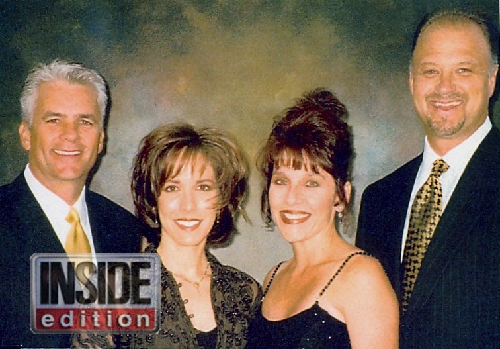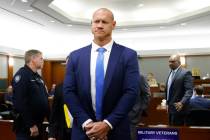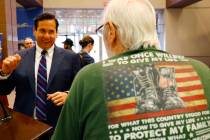Ensign may face more legal problems
WASHINGTON -- It was a surprise when the Justice Department declined to pursue John Ensign in December.
But it would be even more surprising if it happens again, now that the Senate Ethics Committee has laid out strong evidence of wrongdoing against the former Nevada senator, according to some legal experts.
Prosecutors have little choice but to re-examine allegations against Ensign following release Thursday of the committee's findings, plus the added push by its chairwoman, Sen. Barbara Boxer, D-Calif., they said.
In an unusual move, Boxer and Vice Chairman Sen. Johnny Isakson, R-Ga., delivered Senate speeches calling attention to what Boxer called "substantial credible evidence" that Ensign committed crimes.
"The committee has reason to believe that laws were broken, and the Justice Department will look at it," Boxer said. "They have to."
A day after the release of the explosive ethics report that included embarrassing details of the extramarital affair Ensign conducted with his campaign treasurer and the legally questionable steps he took to cover it up, lawyers familiar with the case said consequences are all but certain and could be swift.
"It is only a question of when the government is going to indict," Douglas McNabb, a federal criminal defense attorney, said Friday. "I don't understand why they set it aside before."
CONSPIRACY EVIDENCE
Attorneys were left scratching their heads in December when the Justice Department informed Ensign's lawyers that he was "no longer a target" in a corruption probe that grew out of his affair with Cindy Hampton, who also was his wife's best friend.
News reports, notably a lengthy New York Times story in October 2009 based on information provided by the woman's husband, former Ensign aide Doug Hampton, implicated the Nevada politician in a plan to circumvent a federal lobbying law.
The Senate Ethics Committee essentially confirmed the reports, saying there was evidence Ensign committed conspiracy. The six-member panel went further in accusing the former senator of other crimes and violations of Senate rules, including obstruction of justice, sex discrimination, making false statements and dodging federal campaign law.
Boxer said the evidence was strong enough that the Senate would have considered expelling Ensign had he not already resigned on May 3.
"I think they have egg on their face for dropping (the case)," Melanie Sloan, executive director of Citizens for Responsibility and Ethics in Washington, said of the Justice Department's decision. "The ball is now back in DOJ's court."
Stanley Brand, a prominent Washington attorney and former general counsel to the House of Representatives, said the Justice Department will "certainly" look at the findings of the Senate Ethics Committee.
"I will tell you the Justice Department will take this referral very, very seriously," Brand said.
He said the department previously declined to charge Ensign with a violation of the "revolving-door law," which bars senators and their senior aides from lobbying the Senate for a year after leaving their jobs.
But the Ethics Committee has brought new allegations.
"It's different, it's new, and it's separate," Brand said.
WITNESS PROBLEM
One possible reason that the Justice Department passed in December might be found through clues in the Senate report. It suggests federal investigators may not have had access to at least one key witness.
Ethics Committee lawyers, working through the Senate's legal office, sought immunity from prosecution for former Ensign Chief of Staff John Lopez and for Doug Hampton, according to the report. The Justice Department initially resisted but ultimately agreed to grant immunity to Lopez.
Immunized witnesses "were deposed in December 2010 and January 2011," according to the report.
If Lopez was in that group, his deposition may have taken place after Justice informed Ensign's attorneys that he was not being prosecuted.
"It is fair to conclude that damaging testimony against Ensign was obtained after the alleged Justice Department communication with Ensign's lawyers that they were not prosecuting him," said Tom Fitton, president of Judicial Watch, a legal watchdog group.
"Either way, it ought to be bad news for Ensign," Fitton said. "There is strong incentive and strong pressure for the Justice Department to take action."
Boxer's handling of the investigation, including hiring high-profile special counsel Carol Elder Bruce to tie together the probe and write the final report, sent a strong signal from Capitol Hill to the Justice Department, Fitton said.
"The writing is on the wall as far as the Senate is concerned," Fitton said. "Carol Elder Bruce's involvement holds (the Justice Department) to account, plus the fact the Senate acted to issue the report despite Ensign trying to short-circuit it by resigning.
"Justice may act to protect its reputation," Fitton said. "They will do what is necessary. The Senate runs the show as far as oversight of the Justice Department, so I would suspect that Justice will be responsive."
JUSTICE COULD STAND PAT
Michael Gerhardt, director of the Center for Law and Government at the University of North Carolina School of Law, disagreed. He said he doubted the Senate Ethics Committee's report would influence the Justice Department.
"They can send it to the Justice Department, but the Justice Department's not going to feel bound to do anything with it," Gerhardt said. "They're certainly not required to do anything with it.
"I think the Justice Department reached its conclusion and will likely stand by its decision," Gerhardt said.
McNabb said it is not unusual for the Justice Department to "sit back" and wait for investigative agencies to complete a case before stepping in to prosecute, and that may be what happened here.
McNabb said it happens frequently with financial crimes investigated by the Securities and Exchange Commission.
With the ethics findings in hand, McNabb said the Justice Department might decide on action within a few months.
"All the work's been done, right? If I were a trial attorney I would take all this stuff, I would give it to a couple FBI agents and say, 'check the facts and get back to me and tell me whether the senators got it right or not,' " he said.
Doug Hampton was indicted in March on charges of violating the revolving door law. He pleaded not guilty and his case is pending in federal court in Washington.
The Ethics Committee concluded Ensign conspired with Hampton, and aided and abetted his actions to break the law.
Among other conclusions, the committee also said it found evidence that Ensign's parents, Mike and Sharon, made what appear to be "misleading and potentially false" statements to the Federal Election Commission in affidavits related to the case.
McNabb said prosecutors may convene a new grand jury to consider charges against Ensign. He said also it is possible that prosecutors could amend charges in the Hampton case to encompass Ensign.
"What potentially could happen if the feds wanted to is to say to Ensign, 'We are going to amend the indictment and put you right there with Hampton. And perhaps we will have your parents there with you. Now, here is a plea offer.' "
Brand said Ensign's parents "are clearly going to be the subject of a Justice Department investigation."
"The department has historically used pressure on relatives as leverage against a target," he said.
IMPACT ON Capitol
Brand , who has represented clients in several high-profile corruption cases since leaving the House, said Ensign thought he was going to end his legal problems by resigning.
Because that didn't happen, Brand said, "This is going to reverberate in the Capitol ."
Members of Congress who find themselves in similar situations will be advised by their lawyers to resign before being subjected to an ethics investigation, he said.
"If you are going to pull the plug on your career because electorally this is going to finish you, then get out now," Brand said.
By staying in office as long as he did, Ensign "really put himself in the cross hairs again," said the lawyer, who knows of no other case where a member of Congress has been referred to the Justice Department for prosecution after resigning.
"It's a case of first impression in a lot of ways and some very thorny legal issues," Brand said. "And unfortunately, it's far from over for him."
However, Brand said, Ensign has some serious constitutional issues on his side. For instance, a provision in the U.S. Constitution known as the "speech or debate" clause protects legislative work from interference by the executive branch. The privilege has been asserted in corruption probes of several U.S. lawmakers in recent years.
"That's going to be a big fight," Brand predicted.
Contact Stephens Washington Bureau Chief Steve Tetreault at stetreault@stephensmedia.com or 202-783-1760. Contact Review-Journal reporter Carri Geer Thevenot at cgeer@reviewjournal.com or 702-384-8710.




























